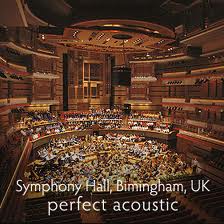Is any orchestra programming better?
mainIn the City of Birmingham Symphony Orchestra’s centenary, the daring continues even when the music director is having family time. Michael Seal, associate conductor (and former violinist) of the orchestra, pushed the envelope out last night with unfamiliar scores on a Brexit Thursday. Exclusive review in the Slipped Disc CBSO100 series by Richard Bratby:
CBSO / Michael Seal / Paul Rissmann
Symphony Hall
17.10.19
****
“The Thrill of the New” was how it was billed, and with the CBSO scheduled to give some 40 premieres over its two centenary seasons, the idea seems to have been to offer a painless introduction to new(ish) music for – shall we say? – the more traditionally-inclined concertgoer. So Michael Seal conducted an appetising spread of bite-size modernist favourites dating from 1909 to last month, introduced and explained with colourful visual aids and unapologetic good humour by Paul Rissmann. A reasonably-sized audience was clearly on board with the concept: chuckling at the final deflation of Jörg Widmann’s Con Brio (timpanist Tibor Hettich took a well-deserved bow), and sighing after the blissed-out string sonorities of Jennifer Higdon’s String Lake.
Seal looked after the details without ever letting the sense of direction flag, and the CBSO responded with deliciously filthy trombones and reeds in the suite from Thomas Adès’s Powder Her Face (still surely the best thing he’s done), glinting half-tones in Knussen’s The Way to Castle Yonder and fluorescent, Janáček-like brass in Daniel Kidane’s Woke: premiered last month at the Proms, and cheered enthusiastically tonight. The players descended gamely into the stalls to lead a mass-participation performance of Steve Reich’s Clapping Music – with guidance from Rissmann, it worked rather well.
If the repertoire tended, overall, towards the relatively “safe” (and Elena Kats-Chernin’s impeccably bland Big Rhap would have raised yawns even in 1920), that’s understandable given the concert’s professed purpose. Hopefully it’ll become an annual fixture; and perhaps in time, in the city of Jonathan Harvey and Brian Ferneyhough, the strength of the dose might be increased. For now, it’s a curious reflection on our culture that the most genuinely startling music on the programme was also the oldest: one of Schoenberg’s Five Pieces, written a decade before the CBSO was founded.
Richard Bratby

See all the season’s reviews here.






Comments